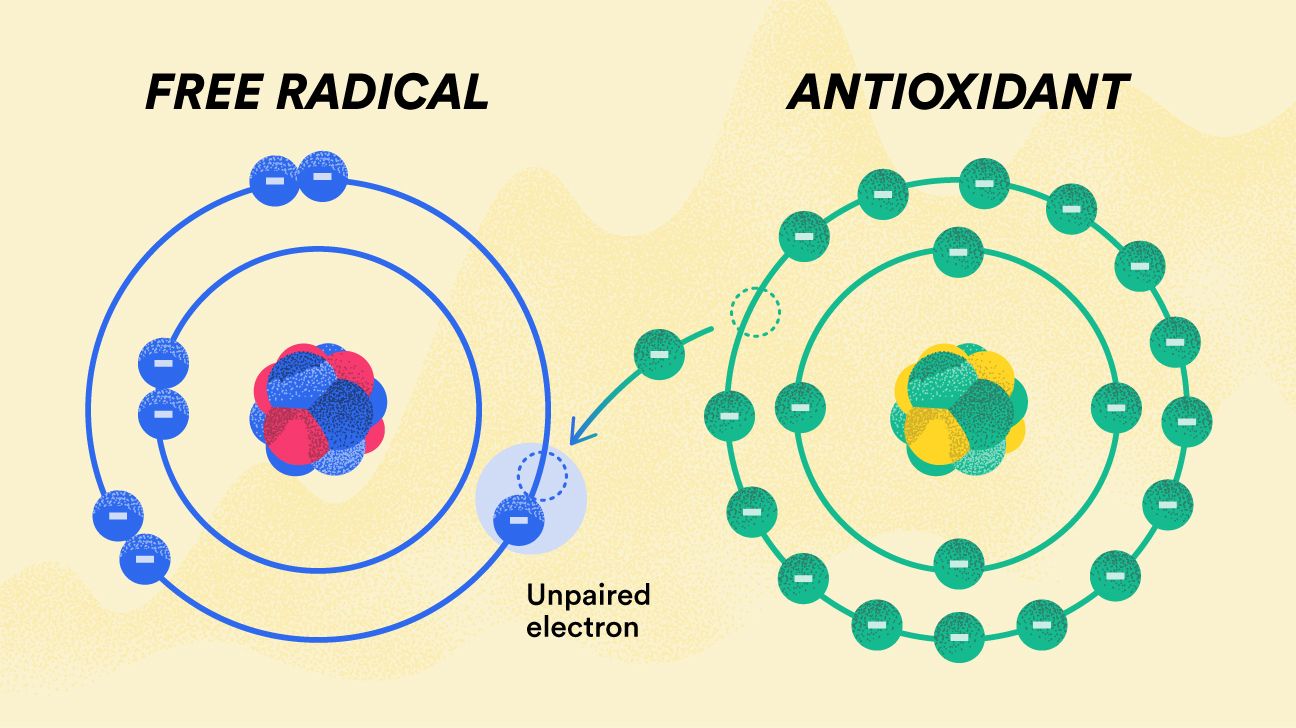You know about antioxidants and you know that they fight free radicals. And free radicals always = bad, right?
Actually, it’s not that simple.
If you bought a new antioxidant face serum or started eating kale daily after reading an article only to think “wait — what the heck are free radicals, exactly?” we’re here for you.

Here’s a little chemistry lesson for you. Free radicals are oxygen-containing molecules that are highly reactive and unstable. They’re formed when molecules or atoms gain or lose electrons.
This results in an unpaired electron that can easily react with other molecules.
These unpaired electrons don’t like being alone, so they search the body for an electron to pair with. This is what can sometimes cause the damage that free radicals are often associated with.
That’s where antioxidants come in
Antioxidants are very generous and can give up an electron without making themselves unstable. This then stabilizes the free radical and makes it stop its potentially damaging search.
Think of antioxidants as the body’s donation center for free electrons.

We’ll get to more of all that below. But for now, let’s hash out some fast facts:
- Free radicals are a natural byproduct and can’t be completely eliminated.
- Free radicals can be formed either naturally in the body through normal metabolic processes or from external factors such as X-rays, cigarette smoking, air pollutants, and industrial chemicals.
- When free radicals accumulate, they may cause oxidative stress. While oxidation is a normal and essential process, excessive oxidative stress can be harmful.
- Oxidative stress is caused when there’s an imbalance between free radicals and antioxidants.
- Antioxidants stabilize free radicals and can be acquired through a nutritious and balanced diet.
If you take away anything from this article, remember this: no chemical acts alone and the goal of free radicals should never be to completely eliminate or prevent them!
Our body has adapted to coexist with free radicals, so going V for Vendetta on them might actually do more harm to your body than good.
Free radicals are formed naturally in the body as a byproduct of metabolism (oxidation). They can also be formed through external factors like smoking and pollutants.
Let’s break down the causes of free radicals from natural processes within the body to outside factors.
| Natural cause | External cause |
| metabolic functions | cigarette smoke |
| exercise | pollution |
| inflammation | pesticides |
| illness or infection | radiation |
| stress | industrial chemicals |
| ozone | |
| certain drugs |
Free radicals may sound like a bad player in the health game but they’re also a natural part of your body’s function. For example, exercise creates free radicals but in general the mental and physical benefits of exercising will most likely outweigh the downsides of free radicals.
So why are people freaking out over free radicals and trying to control them? It’s because when you have too many free radicals that your body can’t regulate, a condition known as oxidative stress happens.
Oxidative stress means that free radicals are triggering chain reactions in your body where proteins, lipids, and DNA are being altered. These alterations can increase your risk for a number of diseases.
You may have heard how inflammation is the root cause of many diseases. Well, oxidative stress is behind inflammation, and that’s why it’s frequently linked to the development of different disease, including:
- inflammatory conditions (oxidative stress has been linked to all inflammatory diseases, including arthritis)
- cancer
- cardiovascular disease
- high blood pressure
- diabetes
- neurodegenerative diseases, such as Parkinson’s and Alzheimer’s
- aging
This may sound intense but if you’re worried about inflammation and oxidative stress, know that the advice for tackling them is pretty similar.
Note: This does not mean oxidative stress and diseases have a direct cause-and-effect relationship.
Much of oxidative stress and disease development is a theory on a cellular level (like how what happens in a petri dish doesn’t mean it’ll always work that way in your body) and research has shown that antioxidants mostly help people who already have increased oxidative stress, rather than the average healthy person.
Actually, yes. Sometimes.
The body can uses free radicals for good. This includes killing pathogens and regulating cell growth.
The immune system, for example, takes advantage of free radicals’ cell-damaging qualities and uses them to destroy pathogens. Pathogens are disease-causing organisms such as bacteria and viruses.
Additionally, free radicals are crucial to many other bodily functions — including cell growth and death, stress responses, and metabolism.
As noted above, the problem with free radicals is when they overwhelm the body. However, our body naturally has defense mechanisms in place.
These defense mechanisms include antioxidants and detoxifying enzymes.
Antioxidants protect both the inside and outside of cells by blocking free radicals from stealing electrons. Detoxifying enzymes protect the insides of cells from free radical damage.
Below are some of the antioxidants and enzymes that help defend against free radicals:
- vitamin C
- flavonoids
- beta carotene
- lipoic acid
- vitamin E
- copper/zinc and manganese-dependent enzymes
- iron-dependent catalase
- selenium
- uric acid
- bilirubin
Depending on your overall health, minimizing free radical production may be as simple as lifestyle and diet choices. For example, antioxidants are one of the best defenders of free radicals and can easily be achieved through whole foods.
This isn’t 100 percent foolproof, however, and can also vary widely based on your genetics as well as pre-existing conditions. Keep in mind there’s also no specific antioxidant that targets free radicals. It’s more about incorporating more holistic health choices and managing stress.
Don’t rely on antioxidant supplements
You may have read research about how supplements can help disease symptoms, but don’t get that confused with reducing risk! Most studies have not been able to link supplements to reduction of disease development.
Since antioxidant supplements may also affect your medications, it’s best to get your fix from whole foods.
Studies have shown that whole fruits and vegetables may effectively help reduce your risk and symptoms related to a wide variety of chronic diseases linked to free radicals.
Since no single substance does the work of a collection of antioxidants, relying on antioxidant-rich whole foods that provide multiple nutritional benefits is key.
Below are the best antioxidant-high foods to include your diet:
| Antioxidant | Food sources |
| vitamin C | broccoli, brussels sprouts, cauliflower, grapefruit, leafy greens, kale, kiwi, lemon, orange, papaya, snow peas, strawberries, sweet potato, tomatoes, bell peppers |
| vitamin E | almonds, avocado, leafy greens, peanuts, red peppers, spinach, sunflower seeds |
| selenium | brazil nuts, fish, shellfish, beef, poultry, barley, brown rice |
| carotenoids (beta-carotene and lycopene) | apricots, asparagus, beets, broccoli, cantaloupe, carrots, collard greens, bell peppers, grapefruit, kale, mangos, oranges, peaches, pumpkin, winter squash, spinach, sweet potato, tangerines, tomatoes, watermelon |
| zinc | beef, poultry, oysters, shrimp, sesame seeds, pumpkin seeds, cashews, chickpeas, lentils, fortified cereals |
| phenolic compounds | dark chocolate, apples, red wine, onions, tea, grapes, berries, spices |
Since free radicals are natural and unavoidable, you’ll drive yourself crazy trying to eliminate them (without success). We cannot actually fine tune the process of oxidative stress yet.
We also understand that marketing has exploited our fear of free radicals (hey, they gotta sell those antioxidant products somehow), so if you have a condition and/or disease, it’s best to talk to a doctor about how to manage and treat your symptoms first rather than focusing on free radicals.
And since free radicals can be produced through environmental and mental factors, there are some holistic health tips that can help with your stress levels.
Focus on your stress levels and external factors
While some external factors of free radical creation are unavoidable (like pollution and stress), developing a routine that can help manage your exposure will help. Thankfully these tips are also beneficial for other aspects of your health!
- Develop a regular exercise routine. This can lead to higher natural antioxidant levels and decreased damage caused by oxidative stress.
- Minimize exposure to external causes of free radicals. This includes smoking, chemicals (including cleaning chemicals), and pesticides.
- Wear sunscreen.
- Practice stress management and coping skills.
- Decrease your alcohol intake.
- Get enough sleep.
Small, manageable changes will result in healthier long-term decisions.
The best first step to take? Start by including these 13 foods in your weekly grocery haul.
